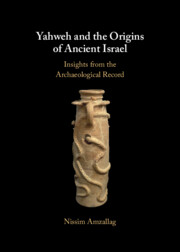Yahweh before Israel
Glimpses of History in a Divine Name
$29.99 USD
- Author: Daniel E. Fleming, New York University
- Date Published: November 2020
- availability: This ISBN is for an eBook version which is distributed on our behalf by a third party.
- format: Adobe eBook Reader
- isbn: 9781108883368
Find out more about Cambridge eBooks
$
29.99 USD
Adobe eBook Reader
Other available formats:
Paperback, Hardback
Looking for an inspection copy?
This title is not currently available on inspection
-
Yahweh is the proper name of the biblical God. His early character is central to understanding the foundations of Jewish, Christian, and Islamic monotheism. As a deity, the name appears only in connection with the peoples of the Hebrew Bible, but long before Israel, the name is found in an Egyptian list as one group in the land of tent-dwellers, the Shasu. This is the starting-point for Daniel E. Fleming's sharply new approach to the god Yahweh. In his analysis, the Bible's 'people of Yahweh' serve as a clue to how one of the Bronze Age herding peoples of the inland Levant gave its name to a deity, initially outside of any relationship to Israel. For 150 years, the dominant paradigm for Yahweh's origin has envisioned borrowing from peoples of the desert south of Israel. Fleming argues in contrast that Yahweh was not taken from outsiders. Rather, this divine name is evidence for the diverse background of Israel itself.
Read more- Offers a deeply new account of the earliest evidence for the god Yahweh 'before Israel'
- Explores how early religion can illuminate the historical background of ancient Israel
- Develops a major new interpretation of early Israelite religion while tracing a scholarly genealogy that helps explain past interpretive paths taken and missed possibilities
Reviews & endorsements
'Fleming's thesis certainly strikes out on its own within debate about the Midianite hypothesis and the origins of Yahweh, but I think it often makes more judicious and careful use of the data, particularly in its interrogation of the Egyptian inscriptions at Soleb and 'Amarah West. There is a degree of speculation involved that is inevitable with trying to take steps into the dark … but I would argue Fleming's volume asks more interesting questions that have the potential to contribute to a more robust and productive engagement with what few data are available to us.' Daniel O. McClellan, Journal of the American Academy of Religion
Customer reviews
Not yet reviewed
Be the first to review
Review was not posted due to profanity
×Product details
- Date Published: November 2020
- format: Adobe eBook Reader
- isbn: 9781108883368
- availability: This ISBN is for an eBook version which is distributed on our behalf by a third party.
Table of Contents
1. Introduction
2. Yhwȝ of Shasu-Land
3. The Midianite Hypothesis: Moses and the Priest
4. The Old Poetry
5. The Name Yahweh
6. The People of Yahweh
7. The Early Character of the God Yahweh.
Sorry, this resource is locked
Please register or sign in to request access. If you are having problems accessing these resources please email [email protected]
Register Sign in» Proceed
You are now leaving the Cambridge University Press website. Your eBook purchase and download will be completed by our partner www.ebooks.com. Please see the permission section of the www.ebooks.com catalogue page for details of the print & copy limits on our eBooks.
Continue ×Are you sure you want to delete your account?
This cannot be undone.
Thank you for your feedback which will help us improve our service.
If you requested a response, we will make sure to get back to you shortly.
×




